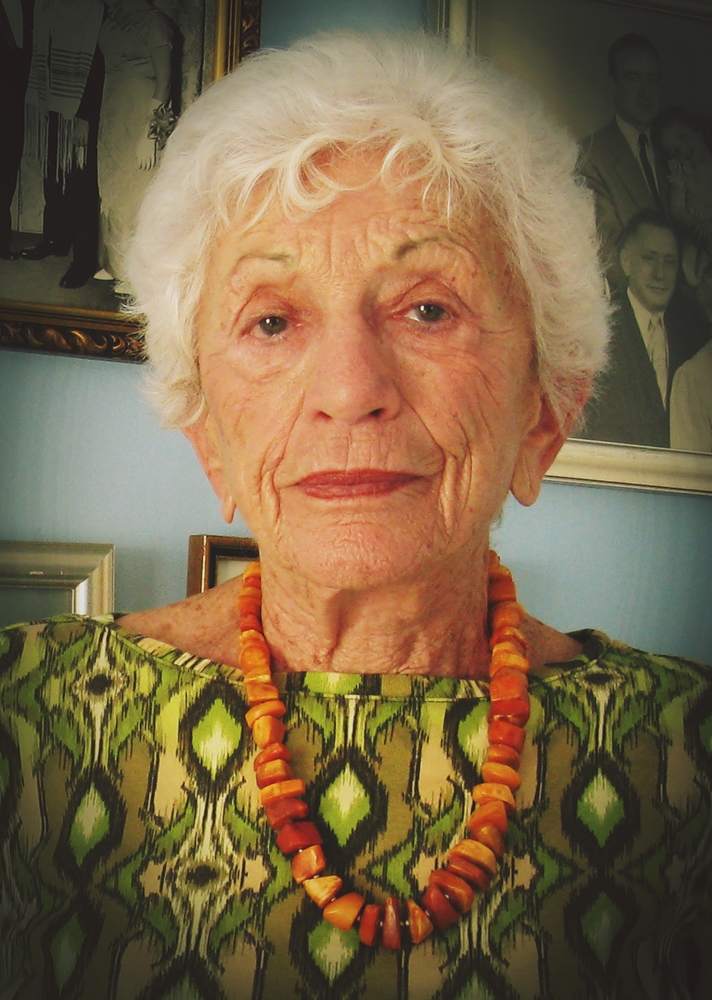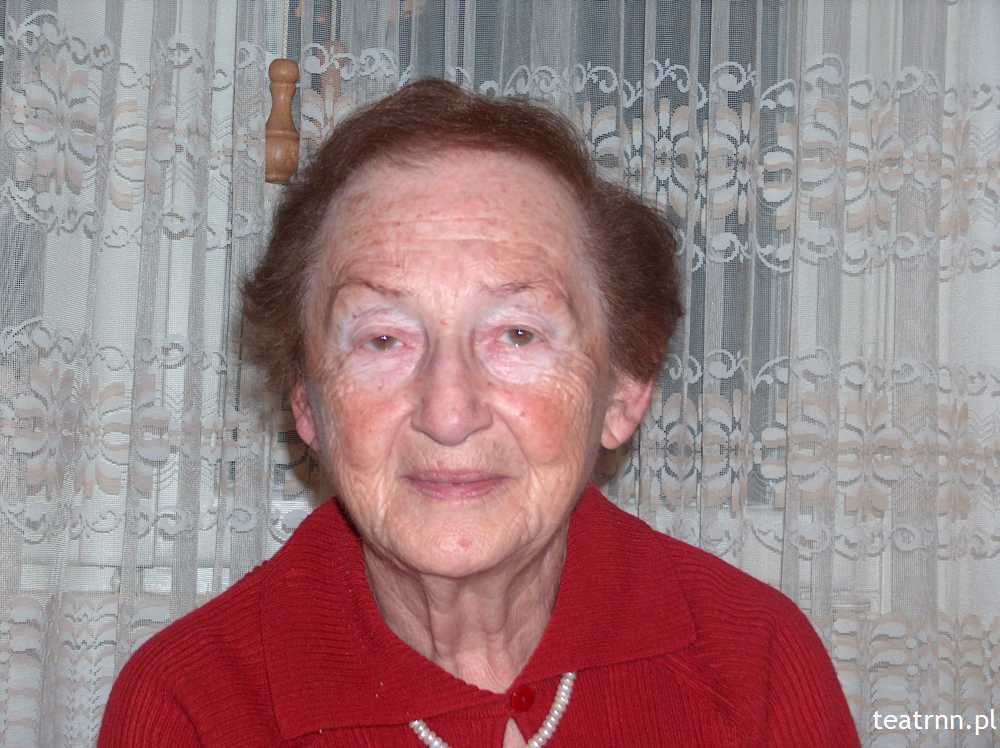After 1 September 1939, about 60% of Polish Jews lived under German occupation. They suffered persecution at the hands of the Wehrmacht and civil authorities. Soldiers, inspired by antisemitic propaganda, degraded, humiliated and brutally mistreated the Jews.
The defeat of the Polish army also led to the imprisonment of about 60,000 Jewish prisoners of war. They were sent to SS camps, such as the labour camp on Lipowa Street in Lublin.
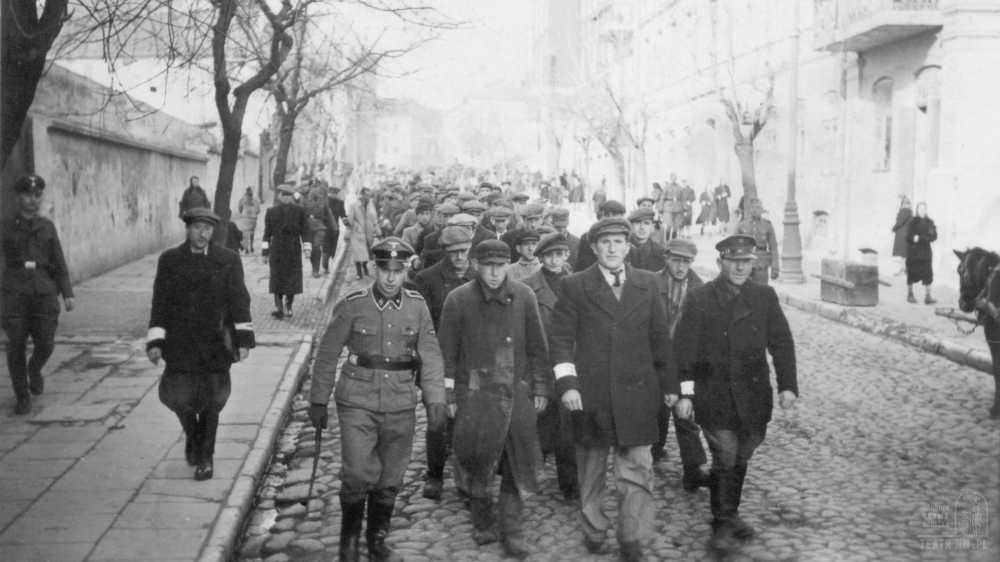
Column of Jewish prisoners escorted by SS officers on Bernardyńska Street in Lublin, circa 1941.
Symcha Wajs’s Collection.
At the beginning of the war, a German soldier asked my grandfather: ‘Why do you have that beard?’ ‘I am a Jew. I have a beard.’ He said: ‘You will now be a Jew without a beard.’ He took out a knife and cut my grandfather’s cheek with the beard. And said: ‘And now, cut on the other side.’ These were not people, they were monsters!
–
Sarah Tuller, born in 1922 in Piaski, recorded in 2010.
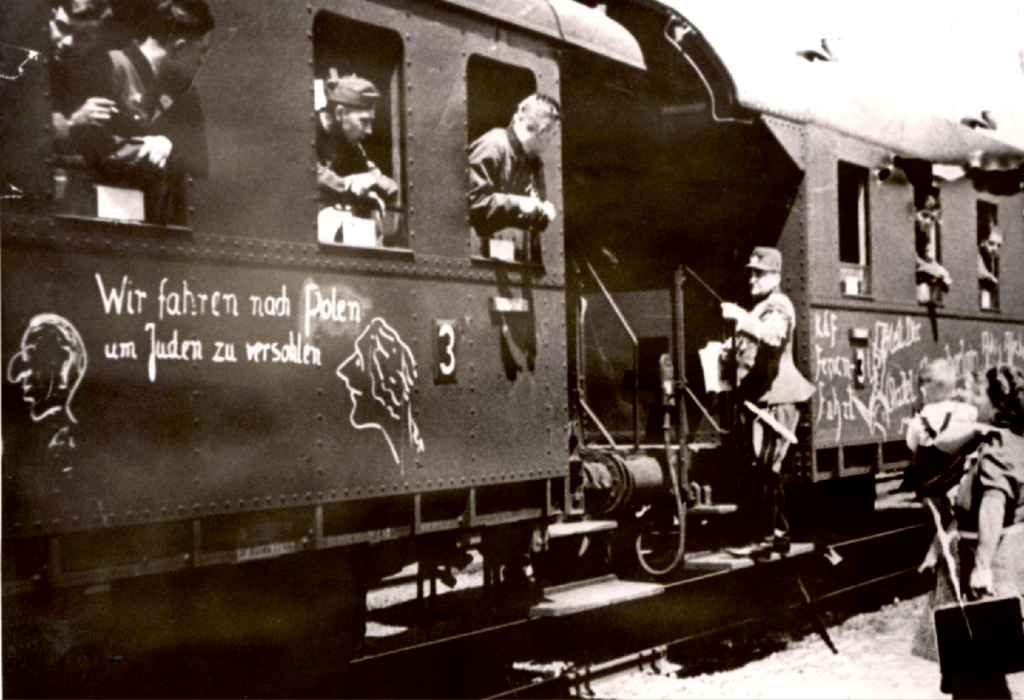
Wehrmacht soldiers on a train to Poland in September 1939. The antisemitic slogan on the train reads: ‘We are going to Poland to beat up Jews’.
Source: Yad Vashem Photo Archive.
In the General Government, Jews were forced to wear white armbands marked with the Star of David. Their freedom of movement was restricted: they were banned from main streets and parks, and prohibited from using pools, cinemas and other public venues. Jewish children were no longer allowed to attend school. Shops were closed, marked as Jewish or plundered. Synagogues and cemeteries were ravaged. Random violence became commonplace.
Every poster at that time was something against the Jews. For example, they informed us that we were not allowed to walk on this street or that street. We didn’t know what was going to happen tomorrow. Every day different orders were hung up. The Germans spoke to us through posters. To this day I don’t approach posters.
–
Różka Doner, born in 1920 in Lublin, recorded in 2006.
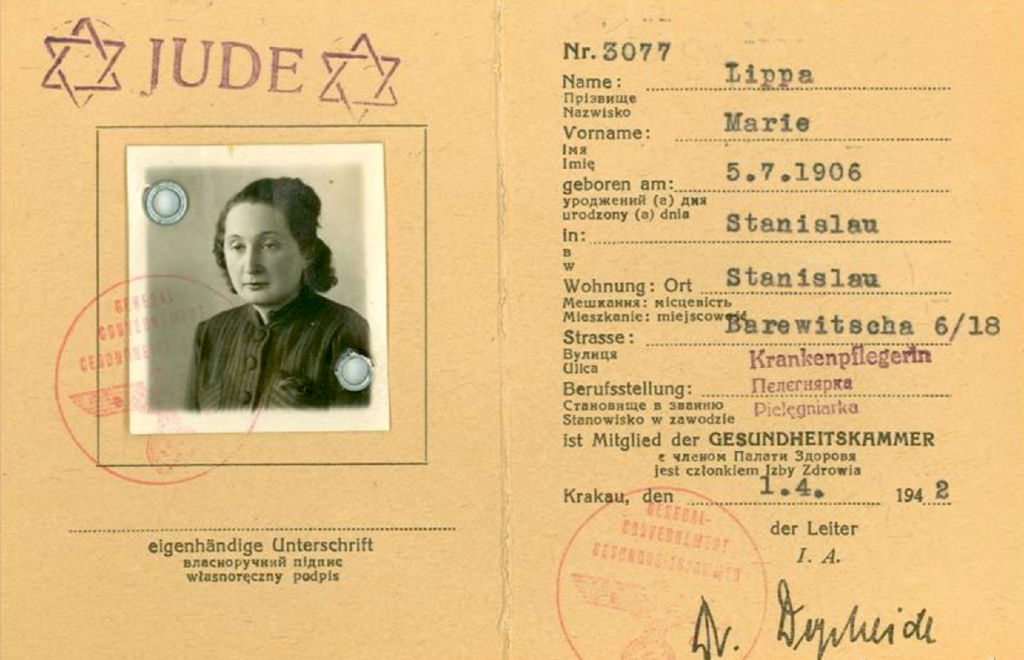
Marie Lippa’s registration card as a nurse, issued by the Chamber of Health in the General Government in 1942.
Symcha Wajs’s Collection.
I did not realise at all what was going to happen. My father lost the factory immediately. The Germans took everything – they just came to the house and took whatever they wanted. And then they threw us out of the flat into the Jewish quarter.
–
Nechama Tec, born 1931 Lublin, recorded 2005.
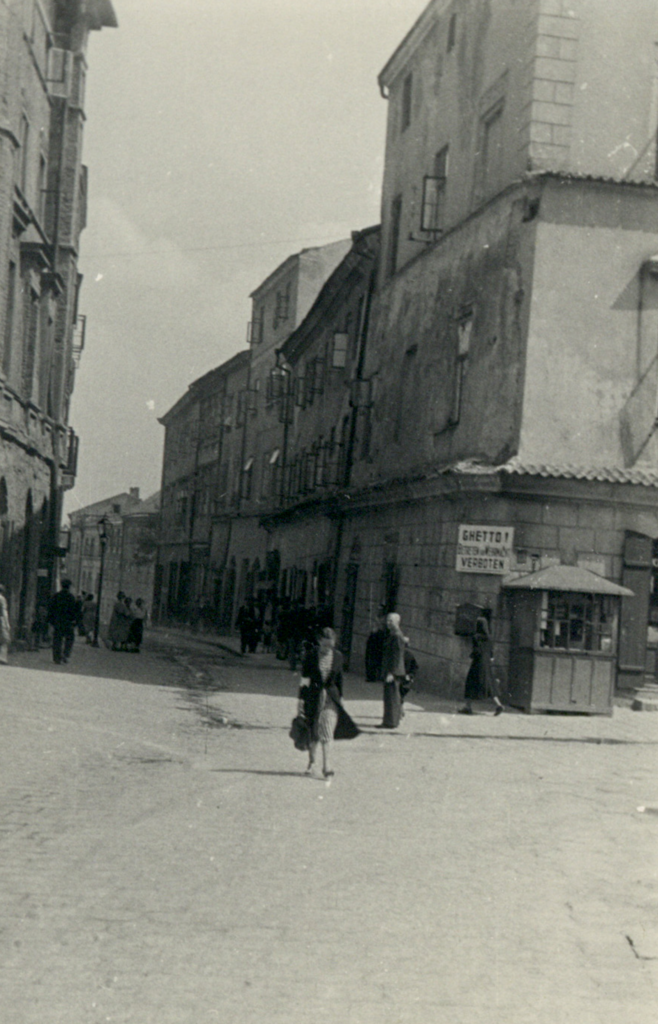
View from the Old Town Square to Grodzka Street in Lublin, circa 1941. A board announcing the ban on entering the ghetto is seen.
Marek Gromaszek’s Collection.
Extras:
Sarah Tuller
Różka Doner
Nechama Tec
Symcha Wajs’s Collection
Marek Gromaszek’s Collection
Sarah Tuller was born Sura Feldzamen in Piaski Luterskie in 1922 to Symcha Feldzamen, a shop owner in Piaski and later in Lublin, and Ester Feldzamen, née Halpern, who came from Krasnystaw. She had two brothers, Mordechaj (born 1919) and Heniek (born 1925). The family lived at 20 Narutowicz Street and later at 22 Narutowicz Street. Sarah attended the Jewish school on Lubartowska Street, and then the Humanities Gimnazjum on Niecała Street.
In October 1939, Sarah’s father and older brother were sentenced to four years’ imprisonment for attempting to cross the German-Soviet border at the Bug River, and were held at the Lublin Castle prison. Sarah also ended up there for not wearing a Star of David armband. Szama Grajer helped to bail out the family, yet the older brother remained in prison. After expulsion from their flat, the family took up residence at 22 Świętoduska Street, where the father’s fabric store was located. Following the consecutive narrowing of the ghetto boundaries, the Feldzamen changed their place of residence several times. They lived, for instance, on Grodzka Street. During her stay in the Lublin ghetto, Sarah constantly had a work permit, which enabled her to survive. She did various jobs, including work at a restaurant, in private German houses or turning heaps of stones. After the liquidation of the Podzamcze section of the ghetto in April 1942, the Feldzamens were resettled to the Majdan Tatarski ghetto. During its liquidation, Sarah’s father managed to bribe a guard, allowing the whole family to escape from the ghetto. They left for Warsaw on false documents. There, they received help from the Karwowski family, with whom they hid until Warsaw was liberated by the Soviets.
The Feldzamens returned to Lublin in October 1944. Sarah worked as a bookkeeper at the housing board. It was then that she met her first husband, Jehoszua Tuller. After the war, the family moved to America and settled in Brooklyn, New York. Sarah’s father and husband opened their own textile business in the US. Sarah and Yehoshua Tuller had three children, five grandchildren and three great-grandchildren. After her husband’s death, Sarah Tuller remarried to Morris Golub. Sarah Tuller died in 2020.
Różka Doner, née Fiszader, was born in Lublin on 20 July 1920 to Hersz Fiszader and Syma (Sefa) née Goldbaum. She had two siblings – sister Debora (born in 1922) and brother Samuel (born in 1924). The Fiszaders lived at 18 Świętoduska Street before the war. Różka’s father was a well-known and respected tailor in Lublin, employing about ten people in his workshop. Her mother ran a fabric shop.
Różka attended the Jewish 4th Primary School at 24 Lubartowska Street, and then the Humanities Gimnazjum of the Coeducational Society for the Establishment of Jewish Schools. She passed her final exams in 1938, yet her plans to study in France were thwarted by the war.
After the outbreak of WWII, Różka’s father, an excellent tailor, sewed for the Germans, which for a time protected the family from persecution. In the spring of 1940, they were resettled from their flat on Świętoduska Street to 23 Lubartowska Street, located within the ghetto boundaries. After the family was moved to the Majdan Tatarski part of the ghetto, Różka worked in a flypaper factory on Lubartowska Street, returning to the ghetto for Saturdays and Sundays, which allowed her to avoid the liquidation action carried out at Majdan Tatarski. She escaped with a friend to Warsaw, where she was handed over to the Polish police by szmalcowniks (or Polish blackmailers) and ended up in the Warsaw ghetto. She left the ghetto several times, making her way to Lublin. During the Warsaw Ghetto Uprising she was outside the ghetto, made her way to Lublin and left to work in Germany, passing for a non-Jewish Polish woman.
Różka returned after the Soviets entered Poland. Her father had worked for the Germans as a tailor until the end, yet was killed with his wife a few days before the Soviets arrived. Różka met a cousin in Lublin, with whom she moved in and worked as a bookkeeper at the Veritas confectionery factory. She got married and gave birth to a daughter in 1948. She moved to Łódź with her family in 1950 and went to Israel in June of the same year. She gave birth to a second daughter and ran a textile shop for ten years. Her husband died in 2006.
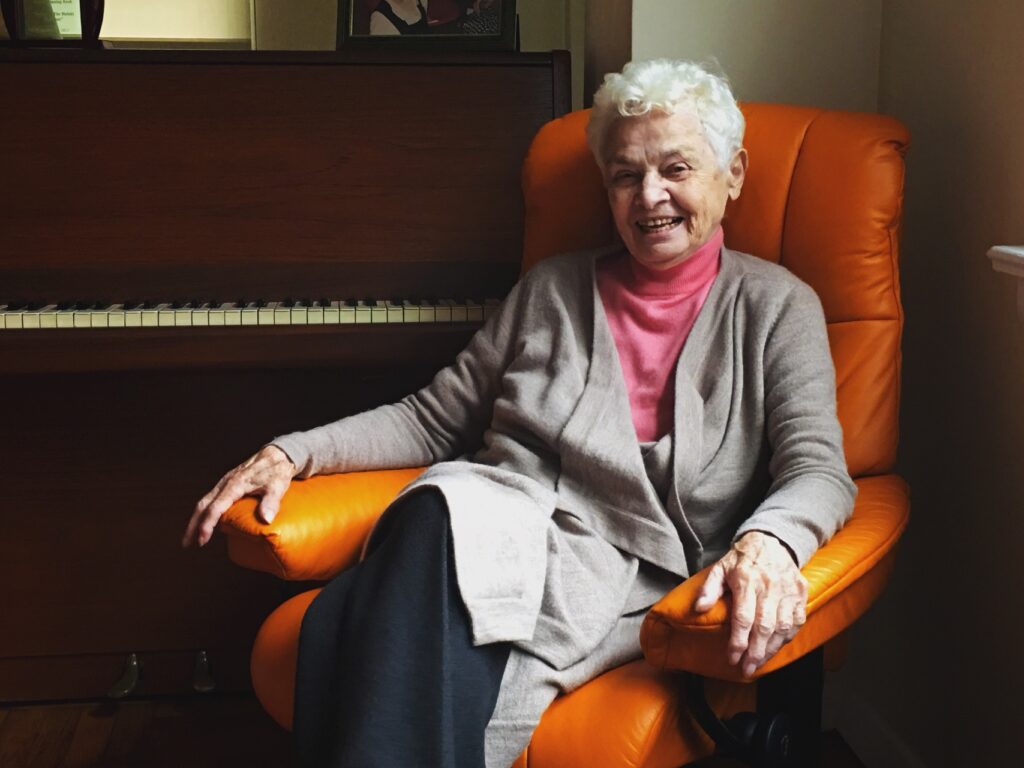
Nechama Tec, née Bawnik, was born in Lublin on 13 May 1931 to Irachmiel (Roman) Bawnik and Estera Bawnik (née Finkelsztajn). Nechama, called Hela at home, had a sister Giza who was four years her senior. Her maternal grandparents, Pejsach and Syma Finkelsztajn, lived in Międzyrzec Podlaski.
The Bawniks lived at 1 Pijarska Street. Nechama’s father was co-owner of two factories, a candle factory at 2 Lubartowska Street and a factory that produced sparklers, art supplies, flypapers, shoe polish and soap at 50 Lubartowska Street. Nechama studied at a private Jewish school, which she attended for only one year, as her education was interrupted by the outbreak of WWII. She then studied at home with a private teacher, Hela Trachtenberg.
The Bawniks were expelled from their flat during the German occupation. Nechama’s father lost his factories and her mother worked as a maid. The family moved into a single room near Grodzka Street. Nechama lived in the Majdan Tatarski part of the ghetto for a certain period. After the liquidation of the Lublin ghetto, the family hid on the “Aryan” side in Warsaw, Otwock and Kielce. Nechama survived the Holocaust by adopting a false Christian identity.
The Bawniks returned to Lublin after the liberation and were one of the few surviving Lublin Jewish families. No one else survived from their family of over 100 people. The Soviets returned the factory to her father, and he now became its manager. They moved into a flat at the back of the factory. Nechama attended the Wacława Arciszowa Gimnazjum at the time, where she continued to conceal her Jewish identity.
Fearing for their safety, the Bawniks eventually left Lublin and ended up in Israel, where Nechama married Leon Tec, originally from Baranowicze. The couple emigrated to the US in 1952. She studied at Columbia University, where she obtained a BA and later a PhD in sociology. She worked as a professor of sociology and later was professor emerita of sociology at the University of Connecticut. In 2002, she was appointed by President George W. Bush to the United States Holocaust Memorial Museum Council in Washington, DC.
Nechama Tec wrote the books Dry Tears: The Story of a Lost Childhood and Defiance, and was the author of numerous academic articles on topics such as Christian aid to Jews or armed Jewish aid to Jews, for which she received numerous awards, including a Pulitzer Prize nomination and the international Anne Frank Prize. She had two children. She died on 3 August 2023 in New York.
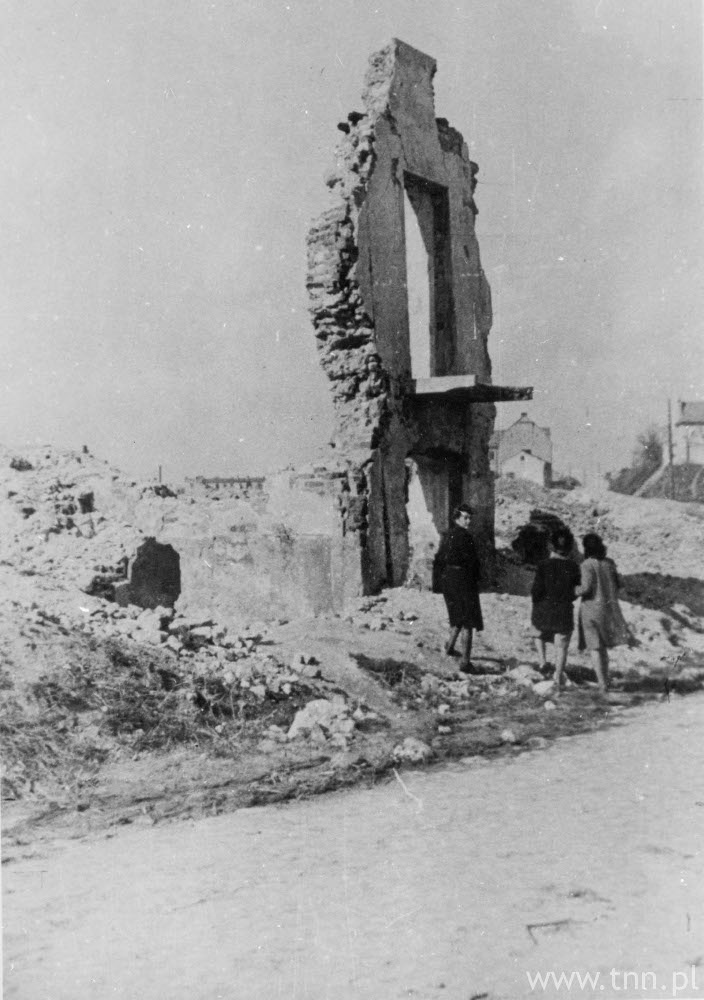
Symcha Wajs’s Collection
The collection of photographs donated to the ‘Grodzka Gate – NN Theatre Centre’ by Symcha Wajs, a social activist, member of the Board of the Warsaw Jewish Religious Community and an irreplaceable activist in the field of the history of Lublin Jews, is priceless testimony to the Holocaust. These images depict various stages of the Shoah in Lublin, from the establishment of the Lublin Ghetto to its liquidation on 16 March 1942, which marked the beginning of “Operation Reinhard”, one of the greatest crimes in European history, aimed at the extermination of the Jewish population of the General Government, and expanded to other German-occupied European countries.
Symcha Wajs’s Collection
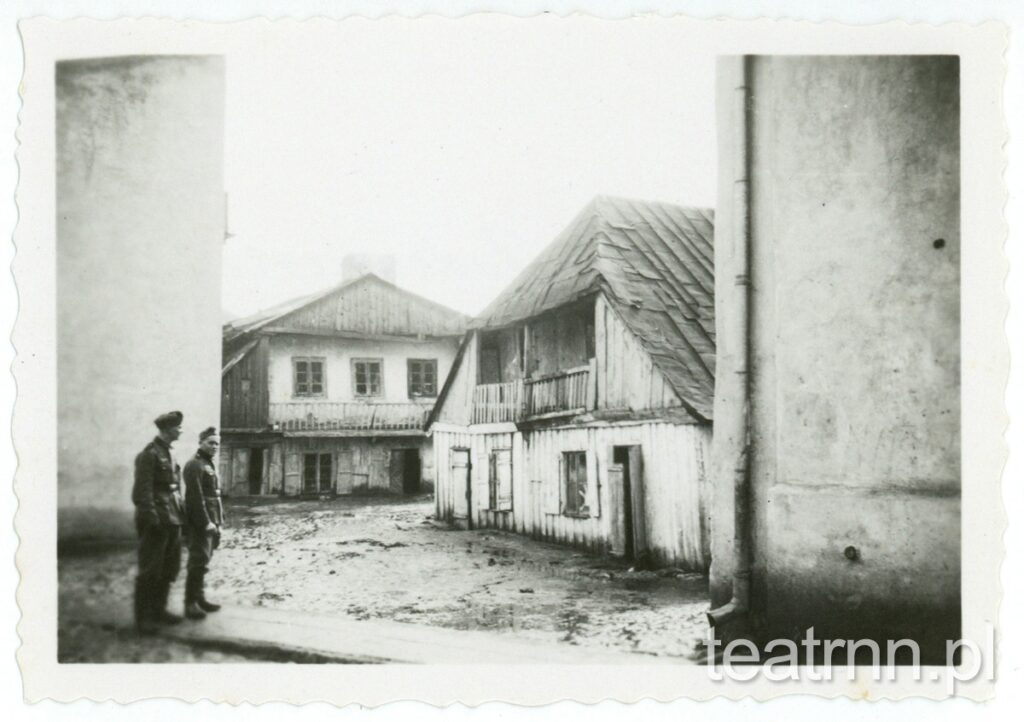
Marek Gromaszek’s Collection
Wartime photographs of Lublin collection includes over 130 photographs from the private collection of Marek Gromaszek. Taken by German soldiers, they mainly depict images of the wartime districts of Podzamcze and the Old Town. Some feature information on the back and some are dated. Most are in a semi-postcard format. The entire collection has been digitised by the ‘Grodzka Gate – NN Theatre’ Centre.
Marek Gromaszek’s Collection

